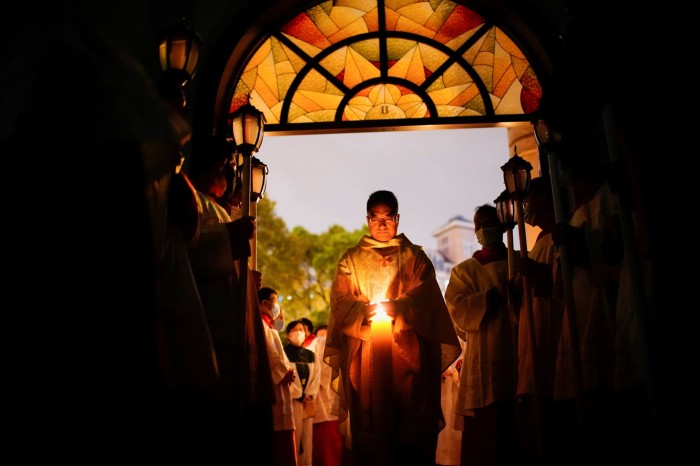[ad_1]
One of Asia’s most senior Catholic clerics is meeting officials in Beijing, as a deal between the Vatican and China over the church’s role in the communist state appears to be fraying.
Bishop Stephen Chow Sau-yan, the top Catholic cleric in Hong Kong, will be the first senior church official from the Chinese territory to visit Beijing since 1994. The visit, which follows an invitation last year from his counterpart in the Chinese capital, comes after Beijing this month unilaterally appointed a new bishop in Shanghai, one of China’s biggest dioceses.
The appointment is an apparent breach of a 2018 deal between the Vatican, which normally appoints its own bishops, and Beijing. The agreement gave the Holy See veto power over the appointment of senior clerics by the Chinese state. It was designed to mend a decades-long divide between state-sanctioned church officials appointed by the communist party and the “underground” church loyal to the Vatican and long attacked by Beijing.
With an estimated 10mn Catholics in China, Rome hoped the deal would lay the foundation for improving relations between the Holy See and Beijing and allow for the expansion of its faith in the Asian superpower.
But the Chinese government under Xi Jinping has attacked all organisations seen as independent of the Communist party, including Christian groups. Several church buildings have been demolished.
The appointment in Shanghai, one of the oldest and most prosperous Catholic dioceses, is a further blow.

“The diocese of Shanghai is arguably the most challenging diocese in China, a test of the agreement between Rome and Beijing,” Gianni Criveller, a Catholic priest previously based in Hong Kong who is dean of studies at the Pontifical Institute for Foreign Missions in Milan, wrote on Catholic news website Asia News. “We worry that this new episode shows that the interim agreement with China and the Vatican is not working as the Vatican hoped.”
Beijing installed Shen Bin, a member of the Chinese Catholic Patriotic Association, as the bishop in Shanghai instead of the auxiliary bishop Thaddeus Ma Daqin, who was previously placed under house arrest after defying the official Communist church.
Vatican spokesperson Matteo Bruni said the Vatican was “informed” of “the Chinese authorities’ decision” and had “learned from the media” of Shen Bin’s installation but declined to elaborate on the “Holy See’s assessment” of the matter.
But Beijing’s recent manoeuvres have left many church insiders pessimistic.
“With the illegitimate ordination of the bishop of Shanghai, obviously the government is not respecting the deal,” said one Hong Kong priest who, as with many church insiders who spoke to the Financial Times, requested anonymity given the sensitivity of the topic. “The Shanghai diocese was a strong diocese with deep faith but what we can do now is very limited . . . those people who have been faithful to the Vatican are disappointed.”

In November, the Holy See Press Office had expressed “surprise and regret” after Giovanni Peng Weizhao was appointed without the Vatican’s blessing as the auxiliary bishop of Jiangxi province. “The Holy See hopes that similar episodes will not be repeated,” the Vatican said at the time.
Hong Kong, a Chinese territory where the leader John Lee is Catholic, has been exempt from some of this pressure, but many remain cautious about speaking out in the wake of a 2019 crackdown on pro-democracy protests.
As well as meeting the bishop of Beijing, the visitors will also meet “other relevant units concerning religious affairs”, according to a Hong Kong church publication, which insiders said was likely to be a reference to Chinese officials.
While insiders said the visit would be focused on an exchange of views and pastoral experience, one person familiar with the trip’s arrangements said it was likely the issue of the Vatican’s official representation in China might come up.
The Vatican, which maintains an unofficial diplomatic presence in Hong Kong and an official presence in Taipei, has previously expressed a wish to install an envoy in Beijing.
But the Holy See is one of the few remaining states that recognises Taiwan, which China views as its own territory. Beijing requires countries to cut ties with Taipei in order to have diplomatic relations.
In response to questions, Bruni said this week that the Holy See would like to establish “a liaison office in Beijing, which would facilitate communication and enhance co-operation” between the Roman Catholic Church and China.
Bruni said at present “there are no talks about the possible establishment of diplomatic relations” between the Holy See and Beijing, and there were no plans to move the papal representation from Taiwan.
[ad_2]
Source link
